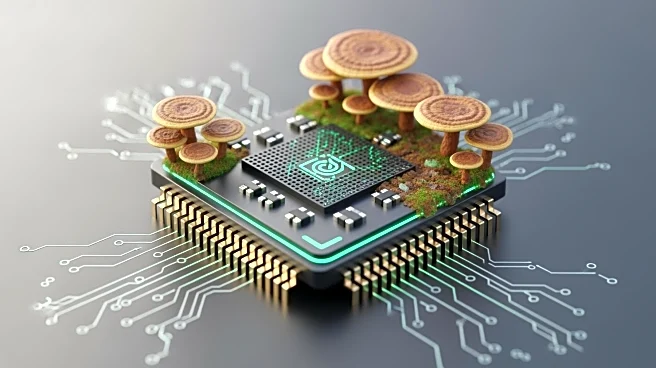What's Happening?
Researchers at The Ohio State University have discovered a novel use for mushrooms in the field of bioelectronics. By cultivating edible fungi such as shiitake mushrooms, they have developed organic memristors,
which function similarly to memory cells in semiconductor chips. These mushroom-based devices can retain information about previous electrical states, mimicking neural activity. This innovation could lead to the creation of eco-friendly computing tools that are less costly to produce and operate. The study, led by John LaRocco, highlights the potential of fungal electronics to reduce electronic waste, as they are biodegradable and require fewer resources compared to traditional semiconductors.
Why It's Important?
The development of fungal-based computing devices represents a significant advancement in sustainable technology. As electronic waste becomes an increasing environmental concern, the use of biodegradable materials like mushrooms offers a promising solution. This approach not only reduces the reliance on rare minerals and high energy consumption associated with conventional semiconductors but also aligns with growing societal awareness of environmental preservation. The potential applications of fungal computing are vast, ranging from edge computing and aerospace exploration to enhancing autonomous systems and wearable devices. This innovation could lead to a shift in how computing devices are manufactured and utilized, promoting a more sustainable technological future.
What's Next?
Future research will focus on refining the cultivation methods and reducing the size of fungal components to make them viable alternatives to traditional microchips. The goal is to achieve smaller, more efficient devices that can be integrated into various technological applications. As the field of fungal computing advances, it is expected that larger systems could be developed for more complex computing tasks, while smaller systems could enhance the performance of portable and wearable technologies. The continued exploration of bio-friendly computing solutions may drive further innovation in sustainable technology.
Beyond the Headlines
The use of mushrooms in computing not only addresses environmental concerns but also opens up new possibilities for the integration of biological systems with technology. This interdisciplinary approach could lead to the development of computing devices that are more in harmony with natural processes, potentially transforming the landscape of electronic design and manufacturing. The ethical implications of using living organisms in technology also warrant consideration, as researchers navigate the balance between innovation and ecological responsibility.









